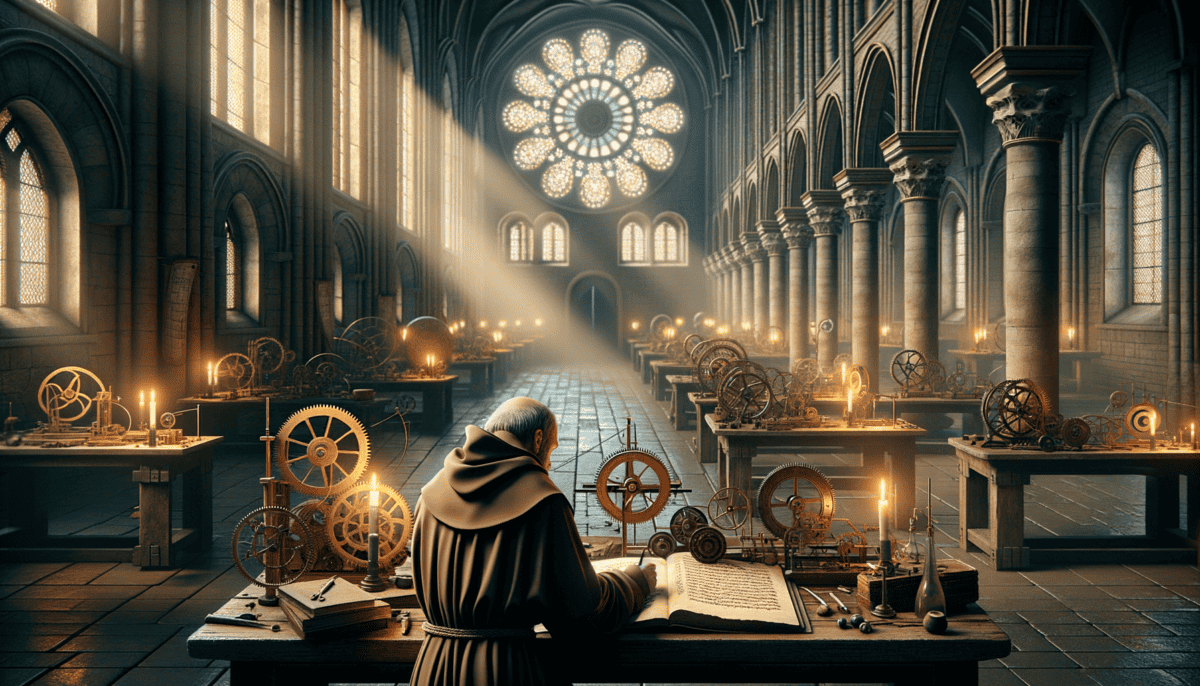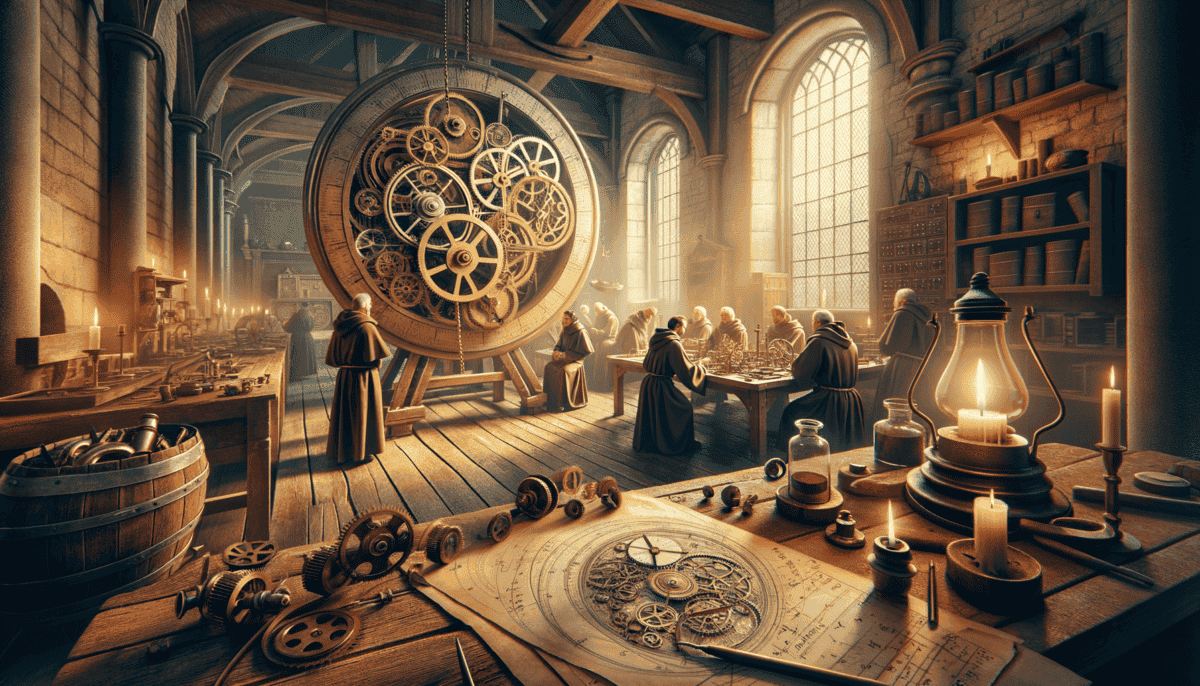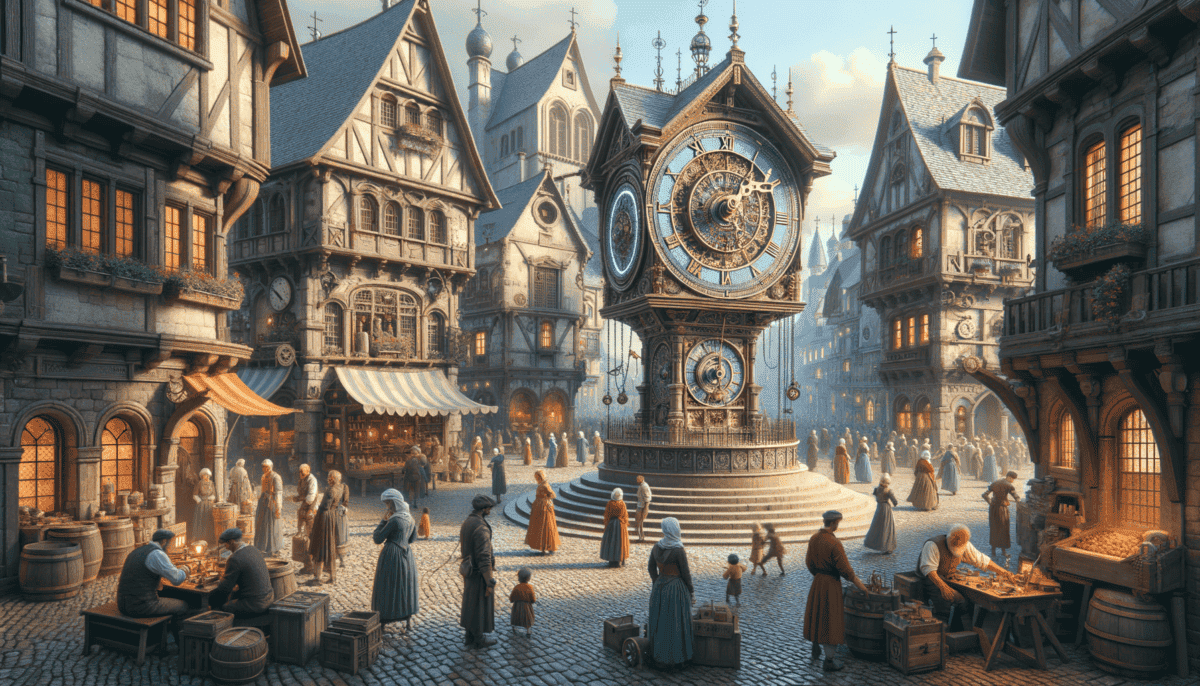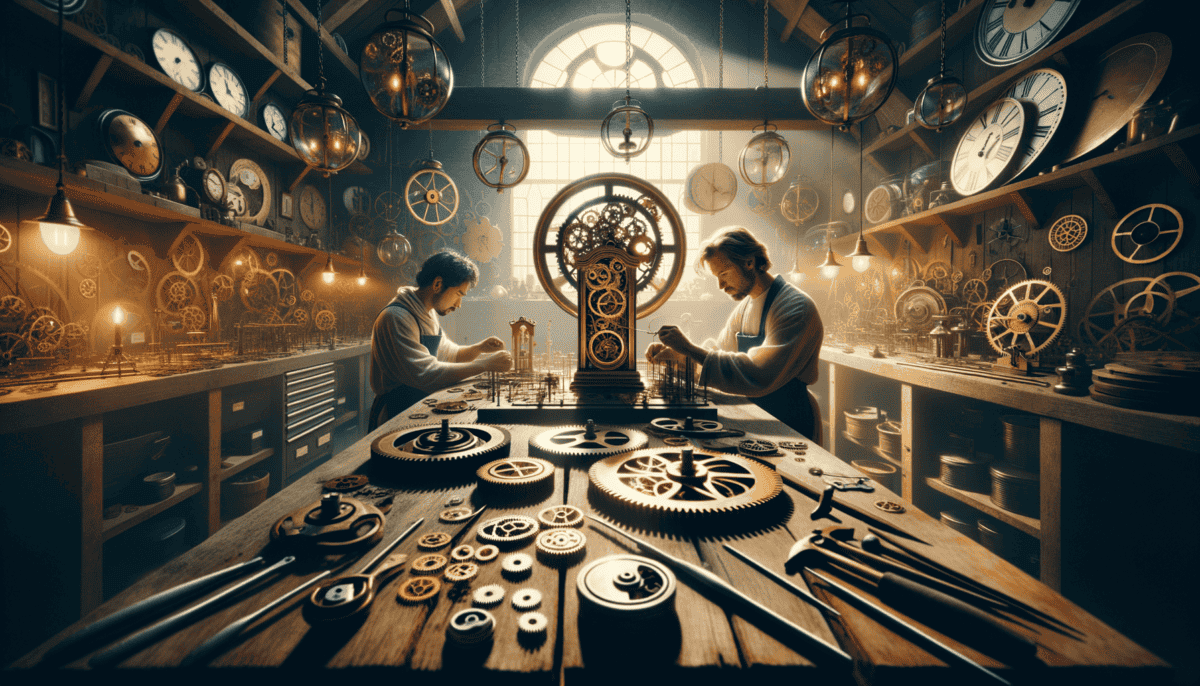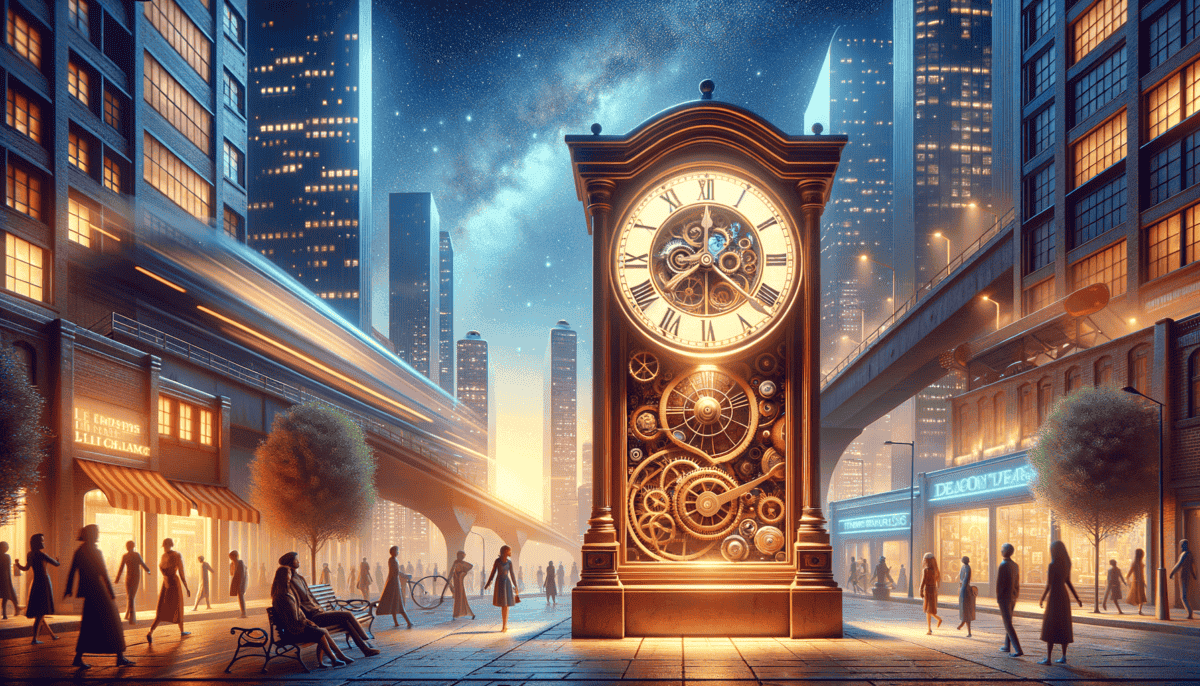Shadows and Sundials
Brother Thomas squinted at the sky, his wrinkled face showing worry. The sun was hiding behind fluffy clouds again. This made it hard to tell the time from the sundial in the monastery garden. ️
"Oh dear," he muttered, adjusting his brown robes. "How will I know when to ring the prayer bell?"
The year was 1000, and keeping time was very tricky. Brother Thomas lived in a big stone monastery with fifty other monks. Their days followed a strict schedule of prayers, but the clouds kept making it hard to stay on time.
"Brother Thomas!" called a young monk named Peter, running up to him. "Is it time for morning prayers?"
Thomas looked at the water clock nearby. It was a big jar with tiny holes that let water drip out slowly. Lines on the side showed the hours as the water level went down. But winter's cold often made the water freeze!
"I'm not sure, young Peter," Thomas said with a sigh. "The sundial is hidden by clouds, and the water clock is frozen again."
Peter sat down on a stone bench, his face thoughtful. "There must be a better way to tell time," he said. "Something that works in all weather."
A Day in the Life
The monks had many important jobs each day:
• Wake up for morning prayers
• Study and copy books
• Work in the garden
• Teach children
• Evening prayers
• Go to bed when the sun sets
But without good clocks, they often got mixed up about the time. Sometimes they were early, sometimes late. It made everyone confused!
"Brother Thomas," Peter asked, watching more clouds roll in, "why don't we build something better than sundials and water clocks?"
Thomas smiled at the young monk's curiosity. "That would be wonderful! But what could we make?"
Just then, Thomas noticed something interesting. The monastery's big wooden door squeaked as it opened and closed. The sound was very regular, like a steady beat. Squeak…squeak…squeak…
His eyes lit up with an idea. "Maybe," he said slowly, "we could build something that moves in a steady way, just like that door. Something with weights and wheels that could count time for us!"
Peter jumped up excited. "That's brilliant! We could make a machine that keeps time!"
As the clouds continued to hide the sun, Thomas and Peter walked back inside the monastery. Their minds were full of ideas about a new way to track time – one that wouldn't need the sun or water at all.
The other monks were gathering for prayers, some early, some late. But Thomas barely noticed. He was already thinking about wheels and weights, and how they might help solve their timing trouble.
“Time is precious,” Thomas told Peter as they walked. “If we can find a better way to measure it, we can make better use of every moment God gives us.”
That night, as the sun set and the monastery grew dark, Thomas lay awake in his small bed. He could hear the steady drip of the water clock and the gentle snoring of the other monks. But in his mind, he was hearing something else – the tick-tock of a machine that didn't exist yet, but someday would change the world.
The Curious Monk’s Dream
In a small workshop in France, a special monk named Gerbert worked late into the night. The year was 999, and his table was covered with strange metal pieces.
“Just a little more,” Gerbert whispered, fitting two metal wheels together. His eyes sparkled with excitement behind his round glasses.
Brother Marcus, his young helper, watched closely. “What are you making, Master Gerbert?”
“Something amazing,” Gerbert smiled. “A machine that can count time without the sun or water. See these wheels? When they turn together just right, they move like time itself!”
The Big Idea
Gerbert had noticed something special about wheels:
• They can turn forever
• They can move at the same speed
• They can work together to do amazing things
• They don’t need sun or water to work
“But Master,” Marcus said, picking up a small gear, “how will the wheels know what time it is?”
Gerbert pulled out a drawing. It showed lots of wheels with tiny teeth, all working together. “Each wheel will count something different,” he explained. “One for minutes, one for hours, just like counting on your fingers!”
The workshop was filled with interesting things:
Metal wheels of different sizes lined the shelves. Heavy weights hung from strings. Tools were scattered everywhere. It looked like a magical place! ✨
“Watch this,” Gerbert said, lifting a weight on a string. When he let go, the weight pulled the wheel around smoothly.
“You see, Marcus? The weight pulls down steady and slow, just like time moving forward.”
But making the perfect time machine wasn’t easy. Sometimes the wheels got stuck. Sometimes they moved too fast or too slow. Gerbert tried again and again.
“Why don’t you give up?” Marcus asked one day, after another try failed.
Gerbert smiled and patted Marcus’s shoulder. “Because every try teaches us something new. And someday, someone will build the perfect clock. Maybe they’ll use some of our ideas!”
One night, Gerbert had a wonderful dream. He saw giant clocks in town squares, helping everyone know the time. He saw tiny clocks in people’s homes. He saw clocks that could fit in pockets!
When he woke up, he worked harder than ever. Even though he couldn’t build everything he dreamed about, he knew his work was important.
“Time is like a river,” he told Marcus. “It keeps flowing forward. And now we’re learning to measure it, drop by drop, tick by tick.”
People came from far away to see Gerbert’s workshop. They watched his wheels turn and weights fall. Many went home with new ideas in their heads.
Even after Gerbert became Pope, he kept thinking about his time machines. He knew that someday, someone would solve the puzzle. His dreams and ideas would help make it happen.
As night fell over his workshop, Gerbert looked at his latest creation. The wheels turned slowly in the candlelight, ticking away the minutes. It wasn’t perfect yet, but it was a start. A start of something that would change how everyone thought about time.
Gears of Revolution
The sun was rising over a busy workshop in northern Italy. Pietro, a skilled craftsman, stood at his workbench. His hands moved carefully over shining metal gears. ️
“Father, come look!” called Pietro’s daughter Maria. She pointed to their newest creation – a system of gears turning smoothly together.
“It’s working better today,” Pietro smiled. “See how the big gear turns the little one? That’s the magic of our new clock!”
The Breakthrough
Pietro and other inventors had made an important discovery. They found that special parts working together could keep perfect time:
• The escapement – a special gear that moved back and forth like a seesaw
• Heavy weights that pulled the gears steadily
• Connected gears that turned at different speeds
• A bell that rang to tell the time
“Why is this better than the old water clocks?” Maria asked, touching a shiny gear.
“Because water freezes in winter, dear one. And it moves differently when it’s hot or cold. But these gears? They stay the same all year round!”
The workshop buzzed with exciting sounds:
Metal clinked against metal. Hammers tapped steadily. And best of all – the soft tick-tock of their new clock!
“Listen to that sound,” Pietro whispered. “That’s the sound of time itself!”
Making these new clocks wasn’t easy. Sometimes the gears would stick. Sometimes the weights would move too fast. But the clockmakers kept trying.
“Watch carefully,” Pietro told Maria, pointing to the escapement. “This little part is the most important. It catches and releases the gear teeth, one at a time. That’s what keeps perfect time!”
Word spread about the new mechanical clocks. People came from far away to see them. Kings and churches wanted their own clocks!
“Our clock will go in the town square,” Pietro said proudly. “Everyone will hear its bells ring the hours!”
A Time of Change
The new clocks changed how people lived. Workers knew exactly when to start and stop. Churches knew when to ring their bells. Ships could better track their journeys.
Maria watched as her father carefully adjusted the weights. “Will everyone have a clock someday?” she asked.
Pietro smiled, remembering Gerbert’s old dreams from long ago. “Maybe someday, little one. First the big clocks in towers. Then maybe smaller ones. Who knows? Maybe one day they’ll make tiny clocks you can carry!”
As the day ended, Pietro and Maria watched their clock tick steadily in the dim light. The gears turned smoothly, marking each moment with perfect beats.
“Time isn’t just shadows anymore,” Pietro said softly. “Now we can see it, hear it, and count it – tick by tick, hour by hour.”
Outside, the sun set on a world that was changing. Thanks to clever inventors like Pietro, people were starting to see time in a whole new way. The age of mechanical clocks had begun!
The Clock Spreads Its Wings
The morning bells rang out across the town square. But these weren’t ordinary church bells – they came from Pietro’s magnificent new clock tower!
Maria stood with her father, watching people gather below. “Look how they stop to check the time,” she said excitedly.
“Yes, our clock is changing everything,” Pietro smiled. “See those merchants over there?”
He pointed to a group of traders setting up their market stalls. They kept glancing up at the clock tower.
A New Way to Work
The clock changed how people worked and lived. Shop owners knew exactly when to open:
• The baker started at 4 AM to have fresh bread ready
• Schools began classes right at 8 AM
• Markets closed when the evening bells rang
• Workers got paid by the hour instead of by the day
“Time is money now!” laughed one merchant. “We can plan our day by the clock, not just the sun!”
The town seemed to move to the clock’s rhythm:
People hurried to work when they heard the morning bells. Children ran to school at the eight o’clock chime. Everyone knew when it was time for lunch!
“Father, look! More clockmakers are coming to town,” Maria pointed to a group of travelers.
Pietro nodded. “They want to learn how to make clocks too. Our ideas are spreading across Europe!”
Time for Everyone
News about mechanical clocks traveled fast. Every big town wanted one. Clockmakers shared their secrets and taught others their craft.
“Now Venice has a clock,” a traveler told them. “And Florence, and Paris too!”
Maria helped her father teach new clockmakers. She was proud to show them how the gears worked together.
“Remember,” she told them, just like her father had taught her, “the escapement must move steadily. That’s what keeps perfect time!”
Changes Big and Small
The clock towers did more than tell time. They became the heart of each town. People met “under the clock” to trade, talk, and celebrate.
“Will you build more clocks, Father?” Maria asked one evening.
“Oh yes,” Pietro replied. “But I’m thinking smaller now. Maybe clocks for inside houses!”
They watched as the sunset painted the clock tower golden. Below, people hurried home for dinner, guided by the evening bells.
“The world runs by our clocks now,” Pietro said proudly. “Just think – this is only the beginning!”
In homes across town, families gathered to eat at the same time. In workshops, crafters planned their days by the hour. On ships at sea, captains used mechanical clocks to know their location.
The age of measured time had arrived! And with it came a whole new way of living, working, and seeing the world. ⭐
The Art of Time
Master Giovanni wiped sweat from his brow as he carefully shaped a tiny brass gear. His workshop buzzed with activity as apprentices learned the delicate craft of clockmaking. ️
“Look here, young Marco,” Giovanni called to his newest apprentice. “Watch how I file each tooth exactly the same size.”
Marco’s eyes grew wide. “It’s so tiny! How do you make it so perfect?”
“Practice, my boy. Years and years of practice!” Giovanni laughed.
The Clock Family
All across Europe, master clockmakers were becoming famous for their skills. Each one had special tricks:
• Hans made beautiful golden clock faces
• Sofia created tiny dancing figures
• Pierre built the strongest gears
• Giovanni was known for his perfect timing mechanisms
They shared ideas and helped each other get better. It was like a big clock-making family!
“Every clock tells a story,” Giovanni told his students. “We’re not just making machines – we’re making magic!”
New Ideas, Better Clocks
The clockmakers kept thinking of new ways to make their clocks better:
They tried new metals that wouldn’t rust
They made gears that turned more smoothly
They added chimes that played pretty songs
“Master Giovanni,” Marco called out one day, “I made my first gear all by myself!”
Giovanni examined the gear carefully. “Well done, Marco! Soon you’ll be making whole clocks!”
A Growing Craft
More and more people wanted to learn how to make clocks. Towns started special schools just for clockmakers.
“Remember,” Giovanni told his students, “a good clockmaker needs:
Sharp eyes for tiny details
✋ Steady hands for delicate work
❤️ Lots of patience
A clever mind for solving problems
Young Marco worked hard every day. He learned about different tools and how to use them carefully.
“Each piece must fit perfectly,” Giovanni reminded him. “Like solving a puzzle!”
Making Time Beautiful
Clockmakers didn’t just make clocks that worked well – they made them beautiful too! They added:
Painted scenes on clock faces
✨ Shiny gold and silver decorations
Musical chimes and bells
Moving figures that danced every hour
“Why do we make them so pretty?” Marco asked one day.
“Because time itself is beautiful,” Giovanni answered. “Our clocks should be too!”
As the sun set, Giovanni’s workshop was still busy. Tomorrow would bring new challenges and new ideas. The craft of clockmaking was growing stronger every day.
More amazing clocks were yet to come – and young clockmakers like Marco would help make them!
The World Changed by Time
The sun rose over a city filled with ticking clocks. From tall church towers to busy town squares, mechanical clocks helped everyone know exactly what time it was!
Marco, now a master clockmaker himself, watched people hurrying to work at exactly 8 o’clock. He smiled, remembering his early days as Giovanni’s student.
“Time sure has changed things,” he said to his own apprentice, Sofia.
Time for Everyone
Clocks weren’t just in churches anymore. They were everywhere!
Homes had smaller clocks
Schools rang bells on time
Factories started work by the clock
Shops opened at exact hours
“Now everyone knows what time it is,” Sofia said. “It’s like magic!”
Clocks Around the World
The story of mechanical clocks spread far and wide:
Ships carried clocks across oceans
Different countries made their own special designs
People everywhere wanted to learn about time
“Look how far we’ve come,” Marco told Sofia, showing her an old water clock. “From dripping water to perfect gears!”
A New Way of Living
Clocks changed how people thought about their days:
| Before Clocks | After Clocks |
| Sunrise to sunset | Exact hours |
| Guess the time | Know the time |
| Follow the sun | Follow the clock |
Looking to Tomorrow
As Marco worked in his shop, he thought about what new inventions might come next:
⌚ Tiny clocks to wear
Clocks that never need winding
Ways to keep even better time
“What do you think clocks will be like in the future?” Sofia asked.
Marco smiled. “Who knows? Maybe they’ll be so small you can wear them on your wrist!”
The Legacy Lives On
The story of mechanical clocks shows how one invention can change everything. From monks wanting to pray on time to whole cities running by the clock, time became something everyone could see and share.
As the sun set, Marco looked at the clock tower in the square. Its hands moved steadily, just like they had for hundreds of years. The great-grandchildren of those first mechanical clocks were still helping people live better lives.
And somewhere, maybe right now, someone was thinking of an even better way to keep time. The story of time wasn’t over – it was just beginning! ✨


